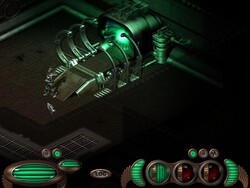Frayed Knights 2 Development Blog: Creating Dungeons
Frayed Knights 2 Development Blog: Creating Dungeons
Development Info - posted by Crooked Bee on Fri 31 August 2012, 12:26:30
Tags: Frayed Knights; Frayed Knights 2; Rampant GamesJay "Rampant Coyote" Barnson has put up a blog post on virtual graph paper, tool-driven development, and creating dungeons for Frayed Knights 2, a sequel to Frayed Knights currently in development. It looks like Jay has switched from Torque to Unity for the sequel. Have a snippet:
To learn how it ended, as well as how long it took to create a dungeon door for the original game in the Torque engine, read the article in full.
I had to architect an entirely new system for developing a core aspect of Frayed Knights gameplay – the dungeon crawling. I want them bigger, better, cooler, and far, far easier to build and test and polish.I wanted big dungeon levels that rendered quickly, which meant that simply creating a ginormous level in Blender or Lightwave and dropping it in the game wasn’t going to cut it – and it would have all the same problems that we had in the first game. No, what I needed was a tool that would allow me to do all that complicated, tedious stuff *quickly* with massive automation to prevent mistakes (especially the ones that might slip through into release). As this was the highest-risk, most experimental part of the sequel, it’s what I focused on first. And longest.
I created a kind of laundry list of features, with my new, improved “dungeon engine” going hand-in-hand with my editing demands. I wanted something as easy to use as drawing maps by hand on graph paper – in fact, something that felt a little like that would be awfully nice. It had to be powerful enough to create something like the maps of Ultima Underworld, and more so… with things unlimited map sizes , and true 3D capabilities with the ability to go over and under territory (yet, considering how humans work mainly in the horizontal, optimized for horizontal movement with small, smoother elevation changes). I wanted to be able to create something as weird and as vertical as the Pit O’ Doom from Frayed Knights: The Skull of S’makh-Daon. Finally – where the capabilities of the editor met their limits – I should be able to just swap in much more sophisticated level geometry from a tool like Blender to replace pieces of a the dungeon built by the tool. That way I could get the best of both worlds, right?
I went through several iterations of the underlying architecture (while learning Unity), many of which ended up requiring me to scrap almost everything several times. After four or five months of this, I was beginning to wonder if I was going to be able to pull any of this off.
I created a kind of laundry list of features, with my new, improved “dungeon engine” going hand-in-hand with my editing demands. I wanted something as easy to use as drawing maps by hand on graph paper – in fact, something that felt a little like that would be awfully nice. It had to be powerful enough to create something like the maps of Ultima Underworld, and more so… with things unlimited map sizes , and true 3D capabilities with the ability to go over and under territory (yet, considering how humans work mainly in the horizontal, optimized for horizontal movement with small, smoother elevation changes). I wanted to be able to create something as weird and as vertical as the Pit O’ Doom from Frayed Knights: The Skull of S’makh-Daon. Finally – where the capabilities of the editor met their limits – I should be able to just swap in much more sophisticated level geometry from a tool like Blender to replace pieces of a the dungeon built by the tool. That way I could get the best of both worlds, right?
I went through several iterations of the underlying architecture (while learning Unity), many of which ended up requiring me to scrap almost everything several times. After four or five months of this, I was beginning to wonder if I was going to be able to pull any of this off.
To learn how it ended, as well as how long it took to create a dungeon door for the original game in the Torque engine, read the article in full.
There are 7 comments on Frayed Knights 2 Development Blog: Creating Dungeons














